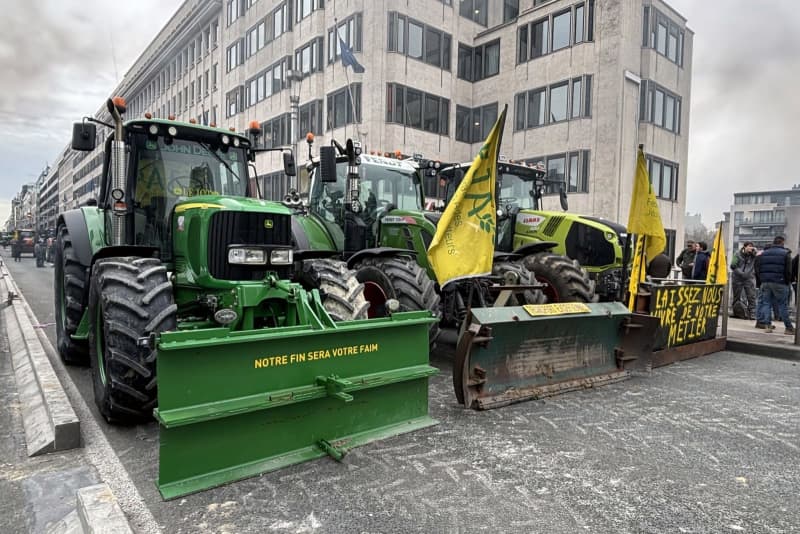According to diplomats, the new compromise stipulates that fewer goods than originally planned will be allowed to be sold duty-free into the EU. The products affected include eggs, poultry, sugar and maize.
Goods affected by the restrictions will only be allowed to be imported into the EU duty free up to a certain amount. When this amount is reached, tariffs will apply again.
The duty-free caps are based on average imports from Ukraine during an earlier reference period.
The new agreement effectively lowers the caps by including the latter half of 2021, when imports were lower than they would later become. France wanted to include the whole of 2021, which would have lowered the averages even further.
In a statement on Thursday, farmers’ lobby group Copa-Cogeca called the deal a “half-response” that didn’t go far enough. It called for automatic tariffs on wheat and barley in addition to lower quantities of goods like eggs, poultry and sugar that can enter the EU duty-free.
France and Poland had unsuccessfully sought to have wheat included in the list of Ukrainian farm products subject to the caps.
DILEMMA: HELPING UKRAINE WITHOUT HURTING EU FARMERS
Since the start of 2024, farmers across Europe have protested against rising costs, the EU’s environmental policy, and cheap food imports, including those from Ukraine. They returned to Brussels with their tractors on Tuesday.
EU leaders seek to restore balance between supporting Ukraine’s economy and protecting EU agricultural producers. EU agricultural ministers met in Brussels on Tuesday to try to appease the farmers’ anger by signing off on measures to loosen conditions for access to subsidies from the bloc’s Common Agricultural Policy (CAP).
“We see how the confidence of Czech and European farmers in the European Union has been shaken, and my concern is to be able to restore this confidence,” the Czech Agriculture Minister Marek Výborný told reporters.
The tighter import rules are the latest in a string of concessions to European farmers. They come less than three months before elections to the European Parliament. Surveys predict the vote will result in a surge of support for far-right parties that are using farmers’ discontent as part of their campaigning.
The changes agreed on Wednesday are part of a one-year extension – from June – of a temporary decision to remove tariffs on Ukrainian goods, in order to help the country’s war-battered economy.
The compromise among member states’ still needs the approval of the European Parliament before it can take effect. If the extension is not in place by June 5, then the prewar tarrifs on Ukrainian goods will be automatically reintroduced.
The European Commission also wants to impose tariffs on Russian grain imports to the bloc. Commission President Ursula von der Leyen said the EU did not want Russia to earn grain revenue from the bloc, or to “influence” the EU’s market.
POLISH BLOCKADE STRAINS TIES WITH UKRAINE
Polish farmers have been blocking Ukrainian agricultural goods coming over the border as they fear being undercut by cheaper produce.
Poland and Ukraine were closer to resolving a conflict over farm imports, Warsaw said Wednesday, on the eve of bilateral talks on the issue. “We can say there’s been a certain rapprochement between the respective positions,” Poland’s Agriculture Minister Czesław Siekierski told AFP. Nevertheless, “each is fighting for himself,” he said.
The border blockades and the dispute have strained ties between the neighbours, even as Poland has shown staunch support for Ukraine since the Russian invasion. Warsaw has been calling for an EU ceiling on Ukrainian imports, after having imposed one unilaterally last year.
The Danish minister for agriculture, Jacob Jensen, said: “There are things in this world that are more important than anything else. On the security and foreign policy front, we must support Ukraine as much as we possibly can.”
He added that “we do this militarily, but we must also do it in terms of ensuring that Denmark and the EU do not put obstacles in the way of them being able to sell their goods and support the economy.” Jensen acknowledged that there may be local markets, such as Poland, that are disproportionately affected by loosening trade restrictions with Ukraine.
The content of this article is based on reporting by AFP, ANSA, BTA, CTK, dpa, Ritzau, STA as part of the European Newsroom (enr) project.
